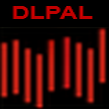
Navigating Market Turmoil with Quantpedia Tools: A Rational Guide for Portfolio Management
The recent imposition of sweeping global tariffs by President Donald Trump has triggered a sharp and sudden selloff across global equity markets. In times like these, it’s natural for panic to set in. However, as quantitative investors, our strength lies in data-driven decision-making, risk management, and maintaining discipline when others lose theirs.
Rather than reacting emotionally, the prudent course of action is to reassess the robustness of our portfolios. Are we diversified across uncorrelated strategies? Do we have components in place that act as hedges during market crises? Fortunately, the tools provided by Quantpedia can help investors, traders, and portfolio managers identify, test, and deploy crisis-resilient strategies in a structured and evidence-based manner.
Let’s explore how.
1. Screening for Crisis Hedge Strategies
Quantpedia’s Strategy Screener includes a dedicated filter for “Crisis Hedge” strategies. When we analyze academic research papers for inclusion in our database, one of the key criteria we assess is the performance of the strategy during equity market downturns. If a paper demonstrates negative correlation with equity markets or shows positive returns during crisis periods, we flag it accordingly.
By selecting the Crisis Hedge category in the Screener, users can instantly identify strategies that historically provided protection during equity drawdowns.
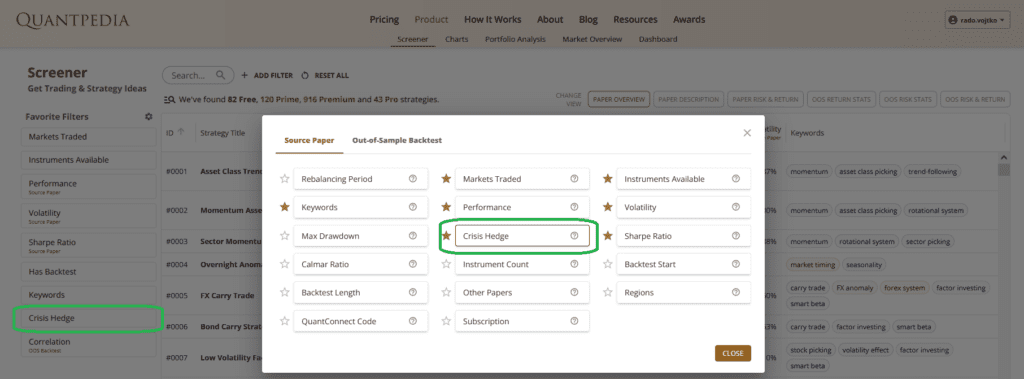
2. Quantifying Correlation with Equities Using Out-of-Sample Data
For a subset of strategies that include full backtests and equity curves, Quantpedia Pro users can leverage the Out-of-Sample Correlation filter to directly measure how closely each strategy tracks the equity market. Lower correlation typically indicates better diversification potential and may signal a valuable hedge.
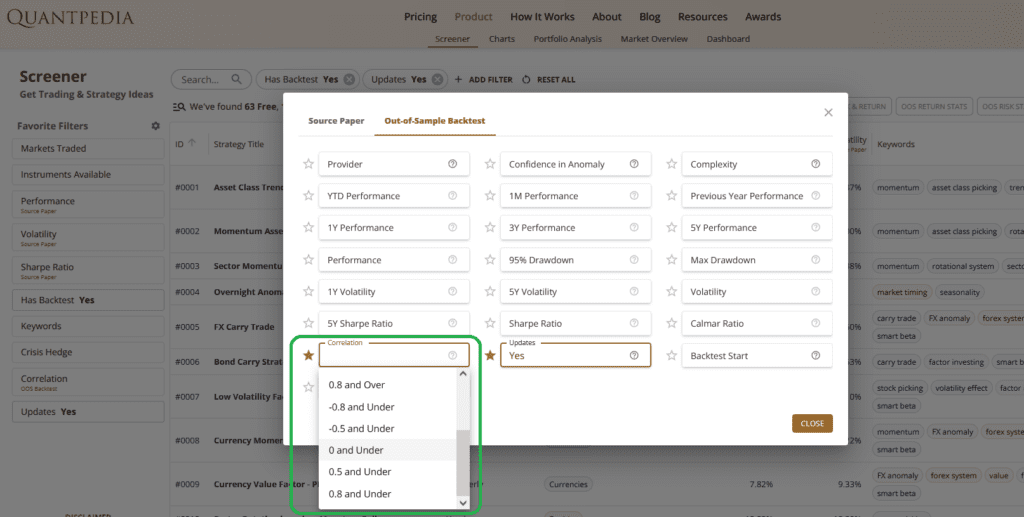
Additionally, sorting strategies by Year-To-Date (YTD) performance helps identify those that have weathered the current market turmoil particularly well.
3. Alternative Filters: Finding Resilient Tactical Models
Beyond explicitly labeled crisis-hedge strategies, investors can also explore which tactical models have performed best during the recent selloff. For instance, by filtering strategies with the “Asset Class Picking” keyword—representing tactical asset allocation approaches—and sorting them by YTD performance, we can identify robust performers.
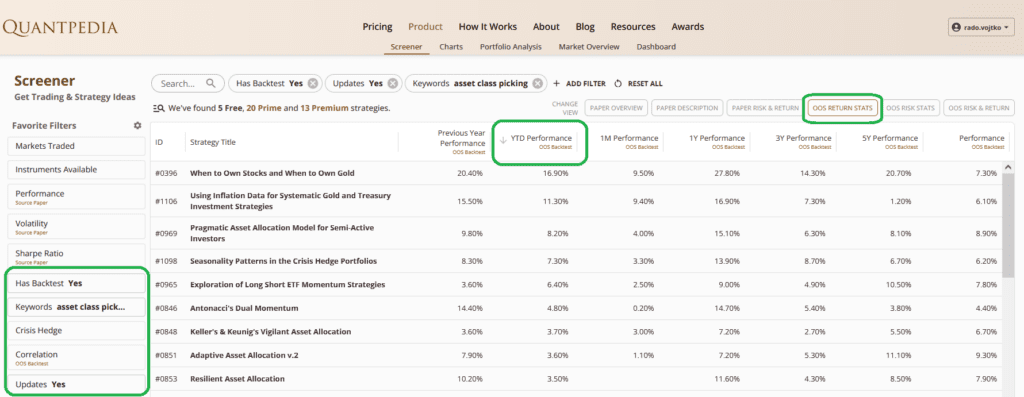
One example is our Pragmatic Asset Allocation model, which recently favored gold and U.S. Treasuries, demonstrating strong relative performance in the current downturn.
4. Portfolio Stress Testing with Historical Shocks
Quantpedia’s Portfolio Analysis tools allow users to construct a model portfolio from ETFs, custom backtests, or Quantpedia strategies. Once built, users can apply historical stress-testing, including simulations of one-day shocks and major events from the past 100 years, to evaluate how their portfolio might respond to extreme scenarios—such as the one unfolding today.
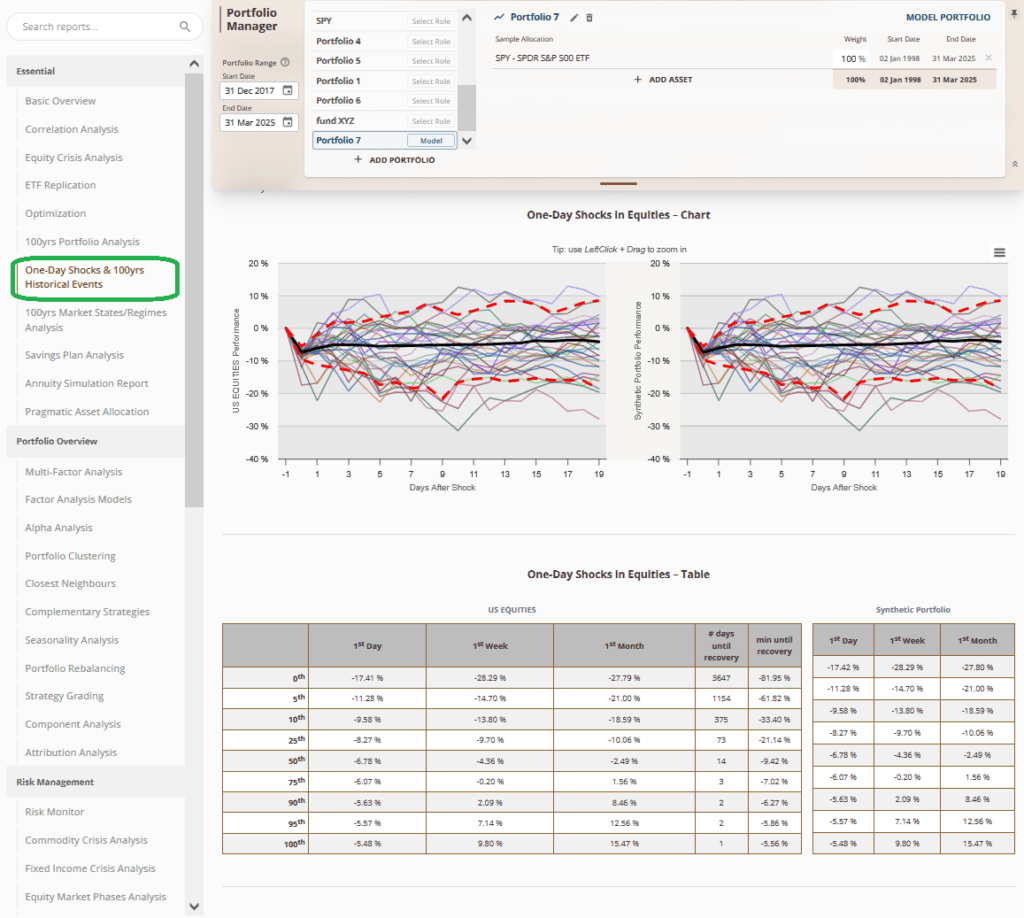
5. Analyzing Performance in Current Macroeconomic Conditions
Another angle is to assess the current macroeconomic phase and analyze how different strategies and asset classes performed in similar environments. Within the Portfolio Analysis section, in the 100yrs Market States/Regimes Analysis report, users can evaluate which components of their model portfolio are well-aligned with the prevailing regime and identify potential enhancements.
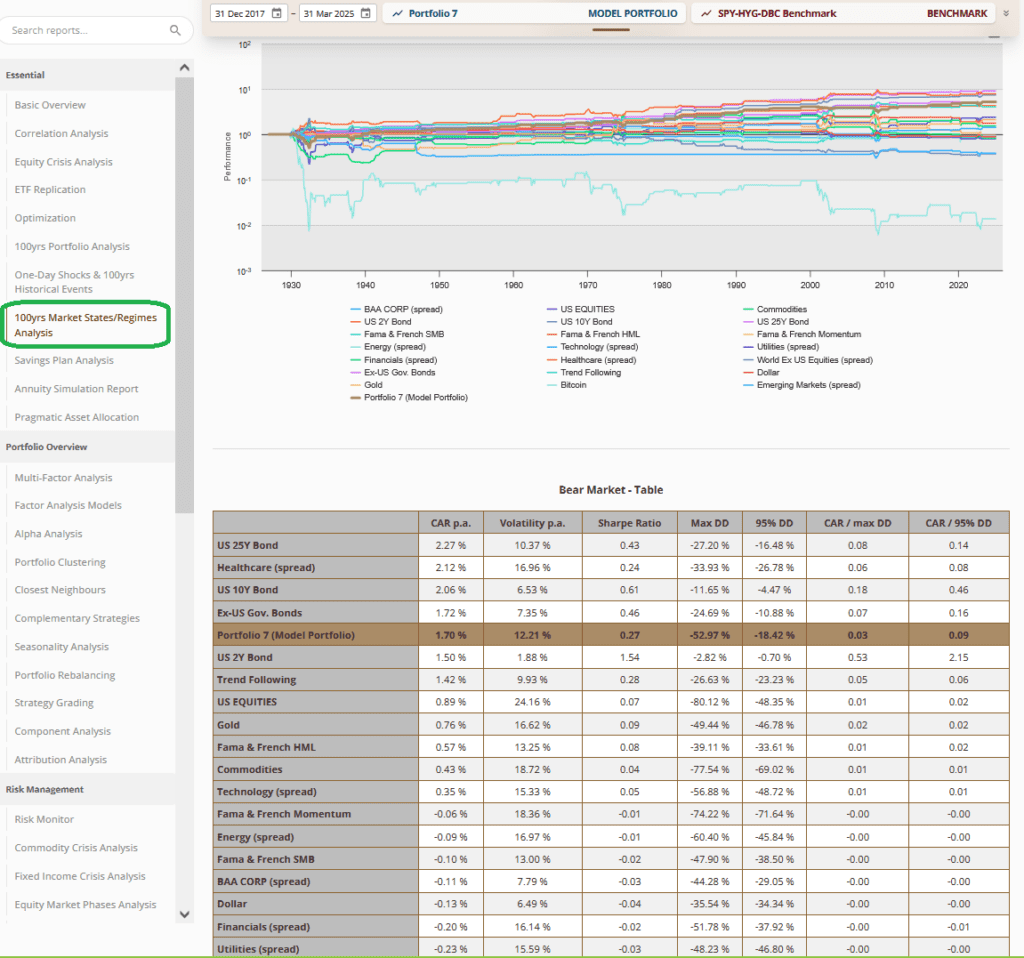
6. Automated Crisis Hedge Detection
Our Crisis Hedge Report in the Portfolio Analysis section scans our entire strategy and ETF database to identify components that would function as effective hedges for a given model portfolio. This automated analysis highlights instruments with low or negative correlation and strong crisis-period performance, enabling more informed defensive portfolio construction.
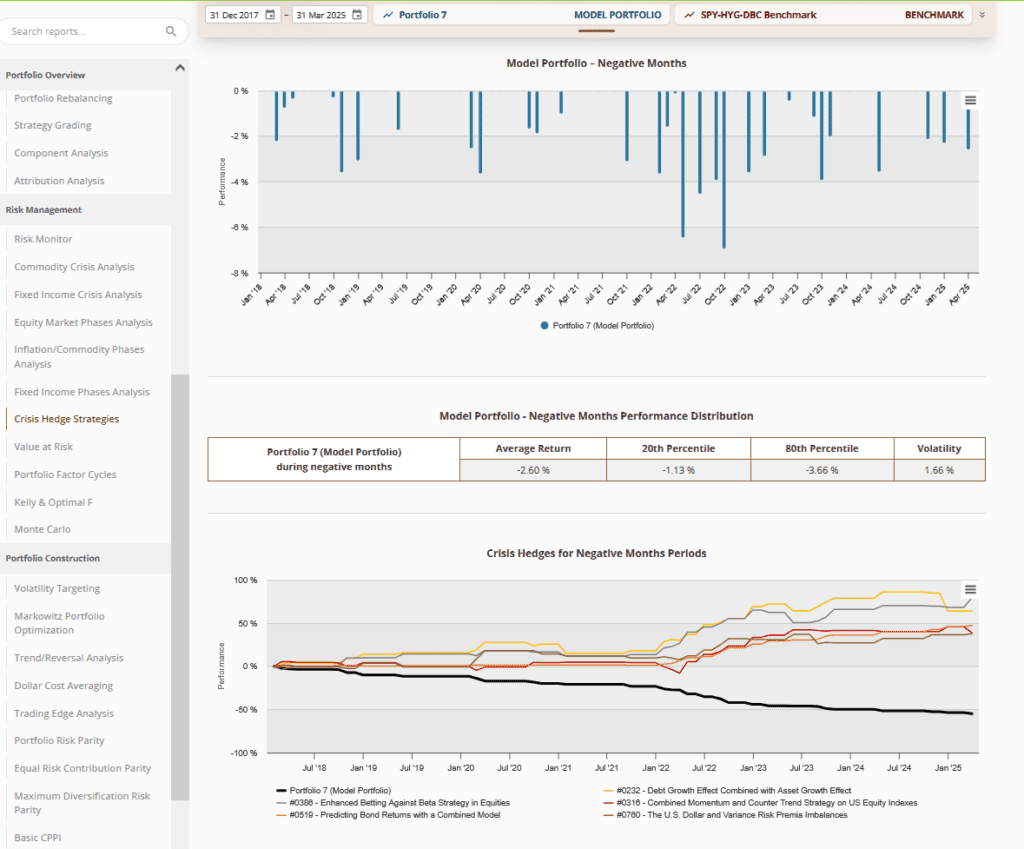
7. Simulating Dollar Cost Averaging During a Crisis
Many investment professionals recommend taking advantage of market corrections through gradual reinvestment. Quantpedia’s Dollar Cost Averaging Report simulates how various gradual investment strategies would have fared during past crises, allowing users to test different approaches for allocating capital into a falling market.
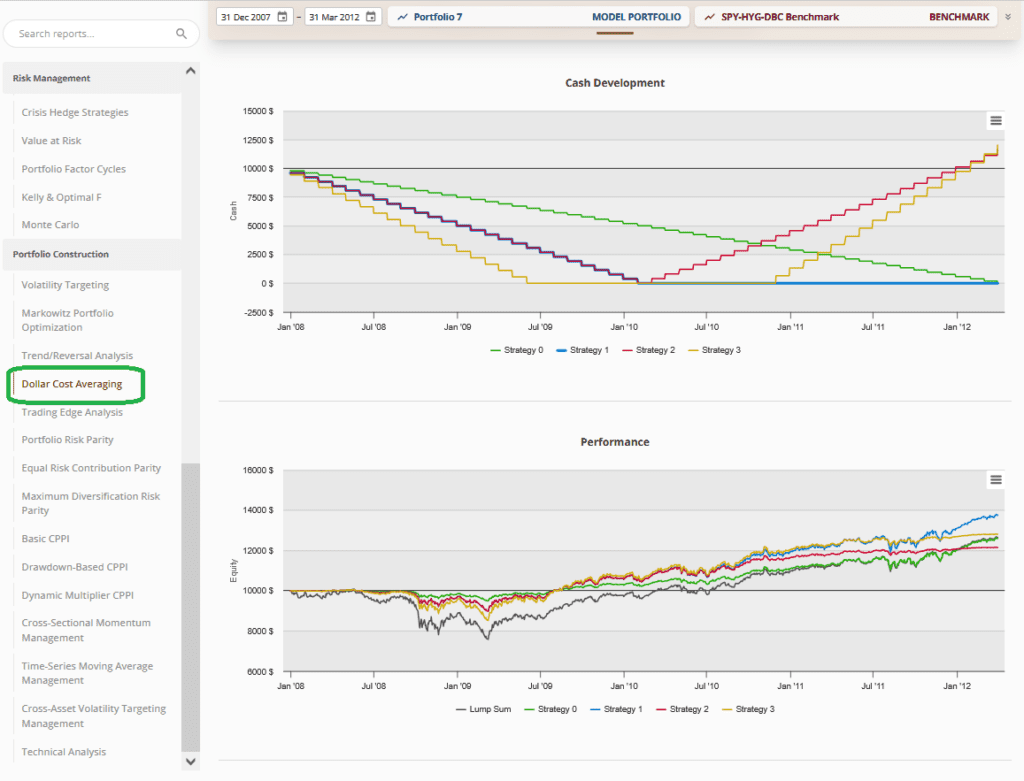
Conclusion:
Even in the face of sudden market shocks and geopolitical upheaval, quantitative investors are far from powerless. With the right tools and a data-driven mindset, we can adapt, protect, and even find opportunity amidst uncertainty. Quantpedia’s suite of tools—from strategy screening to portfolio stress testing—helps investors prepare, assess, and optimize their portfolios for turbulent times.
Now is not the time to panic. It’s time to be smart, systematic, and strategic.
Are you looking for more strategies to read about? Sign up for our newsletter or visit our Blog or Screener.
Do you want to learn more about Quantpedia Premium service? Check how Quantpedia works, our mission and Premium pricing offer.
Do you want to learn more about Quantpedia Pro service? Check its description, watch videos, review reporting capabilities and visit our pricing offer.
Are you looking for historical data or backtesting platforms? Check our list of Algo Trading Discounts.
Would you like free access to our services? Then, open an account with Lightspeed and enjoy one year of Quantpedia Premium at no cost.
Or follow us on:
Facebook Group, Facebook Page, Twitter, Linkedin, Medium or Youtube
Share onLinkedInTwitterFacebookRefer to a friend








